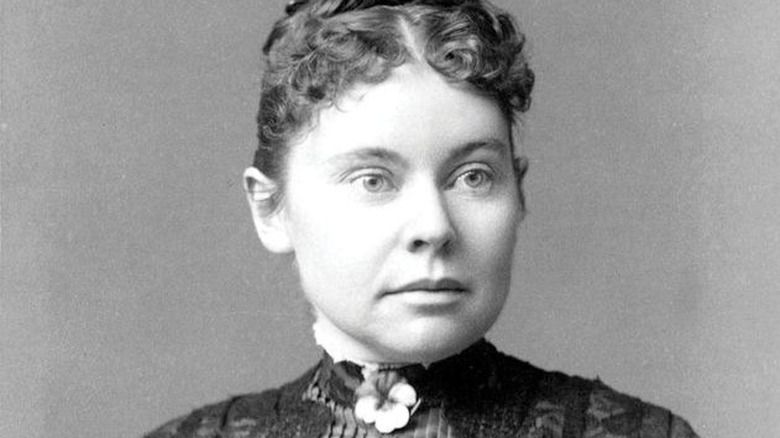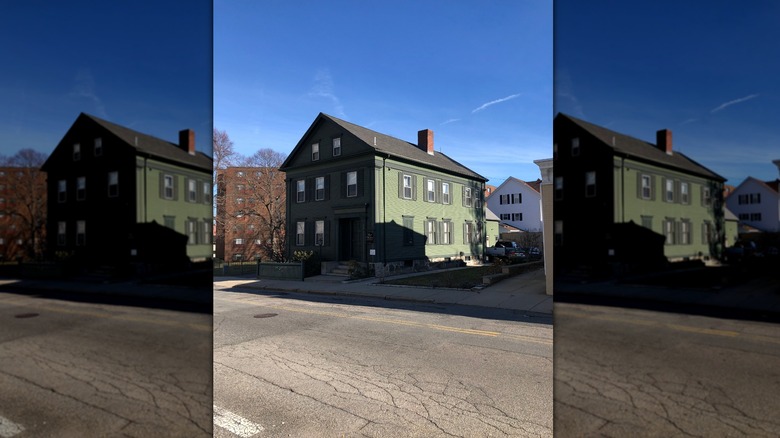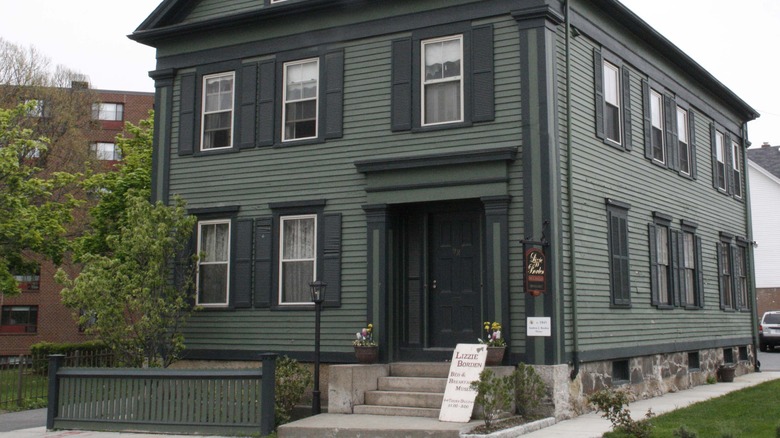What Happened To Lizzie Borden After Her Not Guilty Verdict?
Lizzie Borden, it is said, took an axe, and gave her mother 40 whacks, and when she saw what she had done, she gave her father 41. The alleged whacks occurred on August 4, 1892, when Andrew Borden and his wife, Abby — Lizzie's stepmother — were found dead in their home in Fall River, Massachusetts. The most likely suspect in the grisly murder was Lizzie, the younger of Andrew's two daughters. In her 30s, unmarried, and still living with her father and his new wife, she claimed to have been at home when the murders occurred but had neither seen nor heard anything of the crime. According to Gizmodo, she had exhibited strange behavior before and after the murders; attempting to buy poison before and burning a stained dress after, and she was soon arrested.
The two-week trial, held nearly a year after the crime, became a national sensation. People were horrified by the crime and the victims (Andrew was a wealthy yet modest leader of the community). Lizzie, a Sunday school teacher and a woman besides was seen as an unlikely murder suspect by many; her arrest sparked an outrage. She never gave testimony after the inquest, incriminating evidence against her was deemed inadmissible, and she retained sympathy in the courtroom.
Though her guilt seems nearly certain in hindsight, the jury deliberated for just 90 minutes before acquitting her. Borden and her sister inherited their father's wealth and bought a large home in an upscale neighborhood in Fall River where they lived together for a time.
Lizzie Borden's parents' death made her a wealthy woman
Per CBS News, Lizzie Borden came into $350,000 after her father's death, worth nearly $11.8 million in 2024. Money has been proffered as a motive for killing her father and stepmother; Lizzie and her sister Emma were known to have been upset over gifts spent on their stepmother's family and had demanded property from their father. Andrew Borden was also reputedly frugal to a fault. He maintained a small house when most of Fall River's elite lived in a more respectable neighborhood known as The Hill. Lizzie, who shared common prejudices against the Irish immigrants filling the town, wanted to get away from them and live among those she considered her class.
The Hill community rallied behind Lizzie in the lead-up to her trial, and almost immediately after she was found not guilty, Lizzie and her sister moved neighborhoods. Per The Providence Journal, their new home was 306 French Street, a three-story Queen Anne-style mansion that she dubbed Maplecroft. It was the last home Lizzie would know; she lived there until she died in 1927 at 66 years old.
Maplecroft boasted several modern conveniences, including a gas pump and turnstile in the garage. Jerry Pacheco, a one-time operations manager of the bed and breakfast/museum on the premises, told the Journal that he suspects it became a speakeasy during Prohibition, though he assumes that any basement watering hole run by Lizzie was a free service to friends rather than a business.
Fall River turned their backs on Lizzie Borden
Though Fall River's elite vehemently protested the charges against Lizzie Borden and spoke out in her defense, the stain of scandal left on her by the trial did not endear her to her class after her acquittal. Members of the Central Congregational Church, where Lizzie had been an active member, turned unwelcoming. Local children made her house a favorite target for pranks like throwing eggs and gravel, per The Smithsonian, and the famous nursery rhyme emerged within her lifetime, though it's anyone's guess whether she heard it.
Another person who turned against Lizzie was her sister. Emma Borden came to feel something sinister was afoot in Maplecroft, and she and Lizzie inexplicably severed ties in 1904, with Emma moving out the following year. They never reconciled after Emma left. Once her sister was gone, Lizzie changed her name to "Lizbeth," which could hardly constitute an alias. Under that name, she enjoyed high living and frequent travel; theater was a popular pastime. Lizzie never spoke publicly about the murders, per CBS. But for whatever reason, she never tried to embark on a new life somewhere where there wasn't a schoolyard rhyme immortalizing her as the girl who had murdered her parents with an axe.
In 1927 Lizzie died and her sister Emma followed her in death nine days later. Both women were buried next to their father and stepmother at Oak Grove Cemetery in Massachusetts.
[Featured image by Lizzie Borden House via Wikimedia Commons | Cropped and scaled | CC BY 2.0 DEED]


